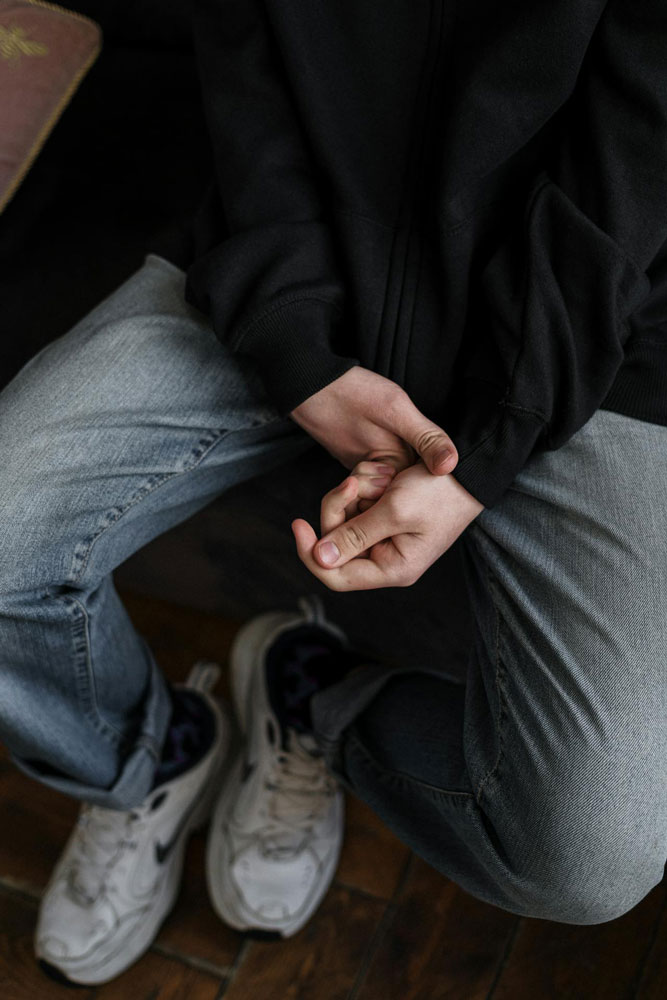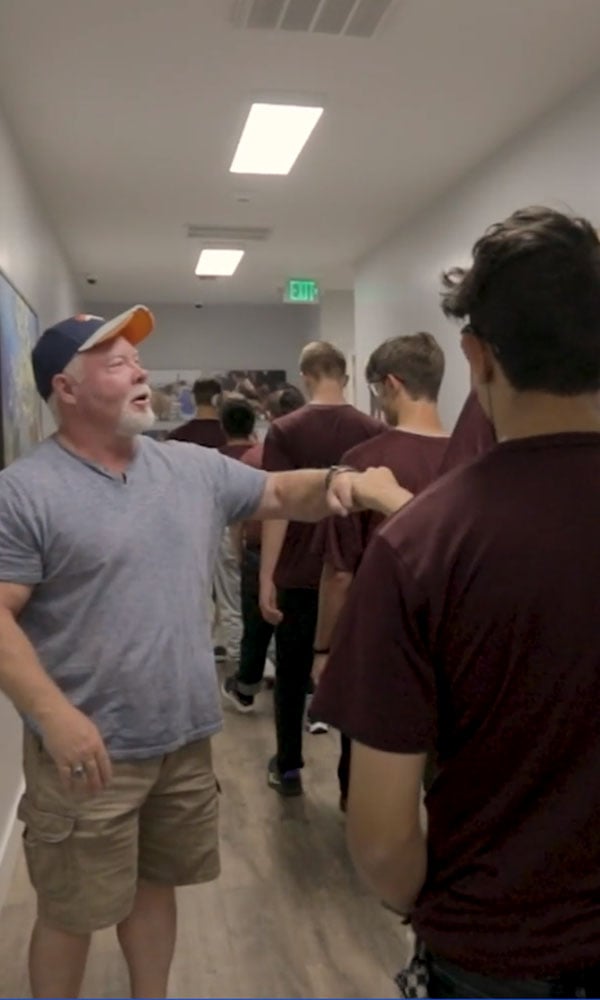
We recognize that when teen boys act out sexually, it’s often rooted in hidden pain or unmet emotional needs, not just misbehavior. Early childhood trauma, adoption-related attachment issues, and early exposure to unhealthy sexual content can all contribute to problematic behaviors. These situations are complex, but what matters most is what you do next.
We know that finding help for hypersexuality and early childhood trauma in teen boys can feel overwhelming and isolating. You are not alone in this journey, and your dedication to seeking solutions for your son is a powerful step toward healing.
This page is here to provide clarity, support, and hope. You’ll learn how trauma in early life can shape behavior, how sexual compulsivity can develop, and why a compassionate, trauma-informed approach is key to healing. We’ll also explain the link between hypersexuality and trauma, and how Oxbow Academy helps boys break free from these harmful patterns.
You’re not alone. Your son is not beyond help. With the right care, recovery is possible.

Oxbow Academy is one of the only residential treatment centers in the country specifically designed for teen boys struggling with trauma-related sexual behaviors. Our team includes Certified Sex Addiction Therapists (CSATs), trauma-informed clinicians, and specialists trained in working with autism, ADHD, and attachment issues. Backed by over a decade of outcomes-based research and a strong record of parent satisfaction, we offer hope and healing for families facing their most difficult challenges.
Your teen can recover from sexual behavioral problems. Contact one of our trained representatives for a free, private consultation
If you’d like to learn more about Understanding Hypersexuality and Early Childhood Trauma in Teen Boys. This article is meant to be as extensive as possible and will probably include sections that may not interest you. Please use the table of contents to find the information you need.
How Early Childhood Trauma Impacts Teen Sexual Development
When a teenage boy exhibits sexually reactive behaviors, it’s often a symptom of something much deeper. Early childhood trauma, whether caused by neglect, abuse, or loss, can quietly shape how a child sees themselves and others. Over time, that trauma can resurface in harmful and confusing ways, including sexually inappropriate behavior.
At Oxbow Academy, many of our students have experienced early trauma in some form. Some have been victims of sexual abuse. Others have lived through physical abuse, neglect, adoption-related attachment wounds, or chaotic home environments. While every boy’s experience is different, what they often have in common is a lack of safety and connection in the early years that leaves lasting emotional and neurological impacts. Our program provides specialized early childhood trauma treatment for teens, helping them understand how their past experiences may be influencing their current behaviors.

How Trauma Rewires a Teen’s Brain and Emotions
Trauma doesn’t just live in the past, it changes how the brain develops. Many boys who come to Oxbow struggle with emotional regulation, attachment, and shame. They may turn to sexual behaviors not because they understand them fully, but because they offer a powerful, temporary escape from difficult emotions like loneliness, stress, sadness, or boredom.
Sexual behavior, particularly pornography use or compulsive masturbation, can become a form of emotional coping. These behaviors trigger the release of dopamine and oxytocin, “feel-good” chemicals in the brain, that can create addictive cycles. Over time, teens may require more extreme or frequent stimulation to feel the same effect. Pornography, in particular, can foster distorted ideas of intimacy and connection, replacing real relationships with a “false sense of closeness.”
For boys with a history of trauma, sexual acting out can feel easier than talking about their pain. The shame that surrounds these behaviors can isolate them even further, reinforcing the very patterns they’re trying to escape.
When Early Exposure and Trauma Intersect
Exposure to sexual content at a young age, especially when layered on top of trauma, can accelerate a child’s sexual development in harmful ways. Many boys first encounter pornography between the ages of 9 and 13, often without context or support. Without safe, open conversations about sex at home, teens may turn to porn as their main source of information, leading to unhealthy beliefs and behaviors.
For some, compulsive behaviors begin early as a way to cope with fear, secrecy, and unresolved trauma in the home. In other cases, access to younger siblings or peers can tragically turn these patterns into problematic or even abusive behavior.
Red Flags: When Trauma Shows Up as Sexualized Behavior
Unresolved trauma can manifest in many ways, not all of them sexual. Some teens may become withdrawn, anxious, or angry. Others may act out in sexualized ways as they try to make sense of confusing emotions or past experiences. These behaviors can range from subtle to deeply concerning.
Possible red flags include:
- Compulsive masturbation, especially in public or to the point of physical harm
- Chronic fixation on pornography, particularly violent or aggressive content
- Inappropriate sexual behavior with younger children
- Sexually aggressive language, threats, or behavior
- Coerced or age-inappropriate sexual contact
- Sexting, voyeurism, or exhibitionism
- Escalating behaviors due to tolerance or loss of control
- Withdrawal symptoms occur when unable to access pornography or act out
In addition to these behaviors, you may notice emotional warning signs such as intense guilt or shame, mood swings, low self-worth, or social isolation. Your son may have trouble forming healthy relationships or seem disconnected from reality, using sexual behavior as a substitute for emotional connection.
Understanding Hypersexuality in Teen Boys
Adolescence is a time of natural curiosity about sex. But it is important to recognize when it becomes problematic. When sexual thoughts and behaviors become compulsive, overwhelming, or harmful, they may indicate a deeper issue known as hypersexuality.
Hypersexuality in teen boys goes far beyond typical development. It may look like:
- Preoccupation with pornography or sexual fantasies, often at the expense of school, relationships, or other responsibilities
- Compulsive masturbation, sometimes to the point of physical harm
- Persistent sexual boundary violations, such as touching others without permission, sexting, or engaging in sexually explicit conversations with younger children
- Escalation of behaviors over time, especially when earlier behaviors no longer provide the same level of relief or stimulation
These are not just “bad choices” or signs of rebellion. Hypersexual behavior is often a symptom of emotional pain. Many boys at Oxbow use sexual behaviors as a way to cope with anxiety, trauma, loneliness, or shame. Others have unmet attachment needs, longing for connection but unsure how to achieve it in safe, healthy ways.
Beneath the behavior, there’s often a boy who is scared, confused, and overwhelmed by urges he doesn’t fully understand. The sexual acting out may provide a momentary sense of control, connection, or escape, but afterward, it often leaves behind deep shame, guilt, and isolation.
Why Punishment Can Make Hypersexual Behavior Worse
It’s natural for parents to feel angry, hurt, or afraid when confronted with their son’s behavior. But punishment and shame do not stop compulsive sexual behaviors, in fact, they often make things worse. Shame drives secrecy. Secrecy fuels compulsion. And the cycle continues.
Recovery begins when your son is seen with understanding, not judgment. Therapeutic support provides a safe space for him to unpack the underlying emotions, experiences, and trauma that drive his behaviors. At Oxbow Academy, our clinicians are trained in sex-specific therapy and trauma informed care for adolescent boys, helping boys break the cycle and begin developing healthier ways to cope, connect, and grow.
Is Your Teen’s Hypersexuality a Sign of Trauma?
For many teen boys, especially those with complex histories, the answer to 'Is hypersexuality a trauma response?' is often yes. It can be a way to cope with overwhelming emotions.
Trauma, especially in early childhood, can shape how the brain understands and seeks out arousal. In some cases, what looks like heightened sexual desire is the teen reenacting or trying to make sense of earlier traumatic experiences. It’s not about typical development or healthy curiosity; it’s about unresolved pain surfacing in a sexualized way.
Childhood traumatic experiences showed a direct effect on general psychopathology and body uneasiness, which in turn were predictors of hypersexuality.

How Trauma Shapes Arousal Patterns
When a young person experiences fear, abuse, neglect, or emotional abandonment, their developing brain begins to build associations, sometimes linking arousal with fear, pain, secrecy, or control. This can lead to the creation of what's called a trauma-based arousal template.
- Some boys use sexual behavior, like compulsive masturbation or pornography, as a way to numb emotional pain or find temporary relief from anxiety or shame.
- Others retreat into fantasy to escape their reality, using sexual thoughts to create a world they can control.
- In more severe cases, pain itself becomes part of the arousal pattern, whether emotional pain from trauma or physical pain from repeated, harmful behaviors.
Over time, the brain wires these patterns through powerful neurochemical responses. Dopamine (linked to pleasure), oxytocin (linked to bonding), and other brain chemicals create a loop that’s hard to break, especially for teens whose brains are still developing.
When Arousal Isn’t About Desire
It’s critical for parents and professionals to understand: just because a behavior is sexual doesn’t mean it’s about desire. Often, it’s about survival. Many of our students’ behaviors are rooted in:
- Attempts to self-soothe or escape painful emotions
- Reenactments of abuse or unhealthy dynamics
- Unmet needs for attachment, validation, or emotional connection
In these cases, the behaviors are less about sex and more about trying to feel safe, connected, or in control. Unfortunately, the behaviors often lead to more shame and isolation, reinforcing the cycle.
Why This Matters in Treatment
When teens don’t feel safe, or when they’re met with shame, judgment, or punishment, they often hide their behaviors. Healing begins only when a boy feels truly seen, understood, and safe.
At Oxbow Academy, we take a trauma informed, compassionate approach. We help students:
- Understand the roots of their behaviors
- Talk openly (without shame) about their thoughts and history
- Learn new ways to regulate emotions and build healthy relationships
- Replace secrecy with honesty, and shame with accountability
We also work closely with families, because growth happens best when it’s supported at home. With the right support, your son can begin to rewrite his arousal template, not through fear or compulsion, but through connection, safety, and self-worth.
If you are a victim of rape or sexual abuse and need assistance please call the National Sexual Assault Hotline at 800.656.HOPE (4673).
Your teen can recover from sexual behavioral problems. Contact one of our trained representatives for a free, private consultation
Adoption and Problematic Sexual Behaviors
Adopted teens often carry incredibly complex life stories. Some of these stories, sadly, might include early trauma, challenges in forming secure attachments, or even struggles with their own identity. These difficult experiences don't just change how a teen views the world around them. They can also deeply impact how that young person handles stress, forms relationships, and for some, even influence the development of sexual behaviors.
Children who experience pre-adoption adversity, where their early caregiver relationships were disruptive or unsafe, may struggle to form secure attachments with their new adoptive family

At Oxbow Academy, we often support adopted students who struggle with feeling safe in relationships, trusting others, and managing intense emotions, factors that can increase vulnerability to problematic sexual behaviors. It’s important to note that these challenges are not caused by adoption itself, but may arise from a combination of early experiences, emotional needs, and developmental factors.
Contact us if you need help with treatment for sexual addiction, sexual abuse, pornography abuse, and other compulsive behavior issues.
The Risk of Early Trauma
Adopted children may also face a higher risk of trauma early in life, including:
- In utero exposure to substances or stress
- Neglect or abuse in early caregiving environments
- Lack of appropriate boundaries or exposure to sexual content too early
These kinds of experiences can disrupt the development of healthy emotional regulation and lead to confusion around intimacy, boundaries, and personal safety. Some teens cope by turning inward, seeking escape in fantasy, pornography, or compulsive behaviors, while others may act out, crossing boundaries without fully understanding the emotional or relational impact.

How Adoption Can Intersect with Problematic Sexual Behavior
For some adopted teens, early trauma, such as abuse, neglect, or boundary violations before adoption, can contribute to sexually reactive or compulsive behaviors later in life. These behaviors often reflect unresolved pain, not defiance. A teen who feels unsafe, disconnected, or unsure of their self-worth may act out in ways that signal deeper emotional distress.
Even teens adopted at birth into stable, loving homes may wrestle with complex emotions around identity, attachment, or belonging. These inner struggles can sometimes lead to confusion around boundaries, trust, and consent, especially during adolescence, when emotional needs become more intense and difficult to manage.
At Oxbow Academy, we recognize that problematic sexual behavior is rarely about rebellion. More often, it is an attempt, conscious or not, to meet unmet needs for connection, comfort, or control.
That’s why we approach every student with empathy, structure, and trauma-informed clinical care. Rather than responding with shame, we help teens understand their behaviors, rebuild trust in relationships, and develop healthy emotional regulation skills.
How Oxbow Academy Supports Adopted Teens with Compassion and Structure
Adopted teens struggling with sexual behaviors need more than discipline or correction; they need a trauma informed environment where they feel safe, seen, and supported. At Oxbow Academy, we provide:
- A compassionate, non-judgmental treatment approach that replaces shame with empathy and accountability
- A highly structured, 24/7 supervised environment designed for emotional and physical safety
- Individualized, holistic treatment plans that address the emotional, behavioral, and relational roots of each teen’s struggles
- Experiential therapies (like Equine Therapy and Expressive Arts) that help students process trauma beyond traditional talk therapy
- Education on healthy sexuality, consent, and boundaries, designed to prevent future harm and promote relational wellness
- Family therapy and support, because recovery must involve rebuilding trust, communication, and connection at home
With the right balance of structure and support, adopted teens can begin to rewrite their stories, not as victims of their past, but as individuals capable of healing, connection, and healthy relationships.
Why Trauma Informed Care For Adolescent Boys is Essential
When a teenager engages in sexually inappropriate behavior, it can be tempting to focus only on stopping the behavior. But at Oxbow Academy, we know that recovery starts with understanding. Trauma informed care is essential because it looks beneath the surface and addresses the emotional wounds that often drive these behaviors. Rather than judging or punishing teens, this approach focuses on safety, empathy, and long-term healing.
Recent research affirms this need, noting that:
trauma has emerged as one of the most prominent drivers of problematic sexual behaviors in adolescents, with theoretical frameworks comprehensively integrating trauma elements that account for the impact of adverse experiences that contribute to problematic sexual behaviors
In other words, teens who act out sexually are often trying to make sense of earlier pain, not just testing limits.

What Is Trauma Informed Care?
Trauma informed care is a therapeutic approach that recognizes the lasting impact trauma can have on a person’s behavior, development, and ability to form healthy relationships. In the context of sexual behavior treatment, this means understanding that sexually compulsive behaviors are often not just “bad choices,” but coping mechanisms developed in response to earlier experiences of fear, pain, or confusion.
At Oxbow Academy, our trauma informed approach is individualized for each student. We treat the whole person, not just their diagnosis or behavior, by exploring the emotional, behavioral, and psychological factors that contribute to their actions. Many students who struggle with sexual compulsiveness have also experienced trauma themselves, including sexual abuse. We meet these students with compassion and a belief in their capacity to heal.
Centered on Safety, Trust, Empowerment, and Nonjudgment
Safety is the foundation of trauma informed treatment. Our campus is designed with 24/7 supervision, including motion sensors, security cameras in sleeping areas, private bathroom access, and carefully monitored routines to ensure students feel secure and protected at all times. Students are surrounded by peers who are working through similar issues, which helps create a sense of community and understanding.
Trust is built over time through consistent, caring relationships. Our therapists foster safe spaces where teens can begin to talk honestly, often for the first time, about their experiences. Tools like the clinical polygraph are used not to punish, but to help students validate their truth and rebuild trust with their families. This process happens gradually, at the pace each student can handle.
Empowerment is central to our program. We help teens take ownership of their choices by giving them tools to regulate their emotions, resolve conflicts, and advocate for their learning and needs. Whether it’s through setting personal goals or leading group discussions, students are encouraged to discover their strengths and develop a healthy sense of self-worth.
Non-judgment is key to effective treatment. Our therapists are trained to address difficult issues with compassion and without shame. We hold teens accountable, but we do so in a way that helps them feel safe enough to be honest. Instead of being labeled or shamed, students are supported in confronting their behavior, understanding its roots, and making meaningful change.
Why It Matters to Work With Trauma Informed Professionals
Teens who act out sexually are not broken or beyond help, they are often trying to cope with emotions or situations they don’t yet have the skills to handle. Trauma informed professionals understand this. They are trained to identify the root causes of behavior, such as emotional dysregulation, family stress, or underlying conditions like ADHD, ASD, OCD, or bipolar disorder.
Rather than focusing solely on stopping a behavior, our clinicians work to understand why it’s happening. For example, a teen who compulsively masturbates to the point of injury may be using it as an escape from stress, shame, or early trauma. Our team helps students recognize these patterns and develop healthier ways to cope.
By treating the whole person, we provide not only structure and safety but also meaningful trauma therapy for teens that fosters long-term recovery.
A Better Alternative to Punitive or Behavioral-Only Models
At Oxbow Academy, we use a strength-based model that views students not as offenders, but as adolescents who need help and support.
Punitive models may stop behavior temporarily through fear or control, but they rarely address the underlying pain driving that behavior. In contrast, trauma informed care for adolescent boys fosters true growth by creating space for honesty, safety, and growth.
Behavioral-only models often focus on surface-level interventions, rewarding good behavior and punishing bad, but neglect the emotional and relational work needed for long-term success. At Oxbow, we use a holistic approach that includes experiential therapies like equine therapy, expressive arts, and SandTray, all of which help teens process trauma in deep and lasting ways.
We also emphasize the power of relationships. Healing happens not just through therapy, but through everyday interactions with clinicians, residential mentors, teachers, and peers. These connections help teens practice healthy relationships in real time and apply what they’re learning to everyday life.
How Oxbow Academy Helps Teen Boys Heal
Oxbow Academy provides specialized, sex-specific treatment for teen boys struggling with problematic sexual behaviors, such as pornography addiction, compulsive behaviors, or trauma-related reactivity. Their approach integrates diverse evidence-based therapies, including individual, group, and experiential modalities like Equine and Sandtray Therapy, alongside trauma-focused treatments like EMDR. All therapists are highly trained, often Certified Sex Addiction Therapists (CSATs), ensuring comprehensive care for underlying causes. The academy fosters a safe, trauma-informed environment with constant supervision and a strong staff-to-student ratio. Crucially, Oxbow Academy actively involves families in the healing process through weekly sessions, education, and aftercare, aiming to restore trust, communication, and hope for both the teens and their families.

Specialized Clinical Approach
At Oxbow Academy, teen boys receive sex-specific treatment in a setting where they can speak openly about their experiences without fear of shame or judgment. This focus is essential because many teens struggling with sexual behavior issues, such as pornography addiction, compulsive sexual behaviors, or sexual reactivity related to trauma, often feel isolated and misunderstood. At Oxbow, they’re surrounded by peers with similar struggles and therapists who are uniquely qualified to help.
All therapists are either Certified Sex Addiction Therapists (CSATs), in training, or supervised by CSAT supervisors. This certification ensures that students receive compassionate, evidence-based treatment for the underlying causes, not just the behaviors, of their challenges.
Therapy is multifaceted and deeply individualized. Students meet weekly for one-on-one therapy sessions and participate in daily group therapy, where they build insight and accountability. Experiential modalities such as Equine Therapy, Sandtray Therapy, and Expressive Arts offer healing through real-world interactions and creative expression. Trauma-focused therapies like EMDR and TF-CBT, combined with mindfulness-based practices, offer effective trauma therapy for teens. Cognitive Behavioral Therapy (CBT), Dialectical Behavior Therapy (DBT), and Acceptance and Commitment Therapy (ACT) provide teens with tools to challenge unhealthy thought patterns and align their actions with their values.
Psychosexual education is another key component. Students explore healthy sexual development, learn about consent and boundaries, and examine arousal patterns in a non-judgmental, structured way. This helps recondition harmful sexual responses and build safer, healthier relationships.
Attachment-based therapy also plays a central role, especially in helping rebuild trust between students and their families. Through tools like clinical polygraphs, open communication, and family involvement, students develop secure connections that form the foundation for long-term healing.
Trauma Informed Environment
Healing happens best in a safe and consistent environment. Oxbow Academy’s campus is designed to prioritize emotional and physical safety, with features like line-of-sight supervision, motion sensors, and 24/7 monitoring. Staff maintain a one-to-four ratio, providing constant support and relationship-focused care.
Every staff member, from therapists to mentors, is trained in trauma informed interventions. The clinical team follows best practices from the Association for the Treatment of Sexual Abusers (ATSA) and draws from models like NOJOS, ensuring students receive the most up-to-date, ethical care. For students with autism or other neurodivergent profiles, staff are specially trained to understand and support their social and cognitive needs.
In this structured yet nurturing setting, students begin to build real-life skills that prepare them for a healthier future. Whether it’s crafting personal mission statements, participating in leadership roles, or completing service projects, every activity is designed to reinforce responsibility, connection, and self-worth.
Helping Families Heal
At Oxbow Academy, parents are part of the rebuilding process from day one. Families participate in weekly therapy sessions, often via phone or video, and work alongside their son to rebuild trust, learn communication strategies, and prepare for life after treatment. Therapists also offer coaching and crisis management support as needed.
Education is key. Through parent seminars, articles, podcasts, and clinician-led discussions, families gain insight into trauma, sexual behavior, and healthy boundaries. These resources empower parents to support their teens’ healing without resorting to shame or fear.
Support groups and family weekends help parents connect with others who truly understand what they’re going through. And through the 90-day aftercare program, families continue to receive guidance and feedback to ensure a successful transition home.
At Oxbow Academy, healing isn’t just about correcting behavior, it’s about restoring hope, rebuilding relationships, and empowering young men and their families to move forward together.
What Real Healing Looks Like: Signs of Progress
Healing from problematic sexual behaviors is a long-term process, and it’s rarely linear. Setbacks can happen, but with the right support, consistent progress is not only possible, it’s expected. At Oxbow Academy, healing is about more than just stopping harmful behaviors; it’s about helping teen boys rebuild their lives with integrity, confidence, and purpose.

Signs of Healing and Progress
As students begin to do the work of recovery, certain signs often emerge that reflect real and lasting change:
- Healthier Boundaries and Respect for Consent
Teens gain a clearer understanding of respectful relationships, learning not only about boundaries and consent, but also how to build trust and emotional safety with others. This knowledge gives them the tools to protect themselves and others, building respectful relationships based on mutual trust. - Improved Emotional Regulation
Through trauma informed care and targeted therapy, students learn to identify, understand, and manage their emotions in healthy ways. Rather than reacting impulsively or shutting down, they begin using practical tools to handle stress, frustration, and sadness. - Increased Empathy
Many boys come to Oxbow with diminished empathy, especially if their behaviors have been shaped by addiction or trauma. As they work through shame and begin to understand the impact of their actions, empathy and compassion naturally develop. - Rebuilding Trust Through Honesty
Learning to tell the truth, especially after patterns of secrecy, is essential. From early therapeutic tools like the clinical polygraph to daily accountability in focus groups, students are encouraged to practice radical honesty with themselves and their families. - Personal Responsibility and Accountability
Each student creates a Mission Statement, a personal affirmation and standard of accountability. This daily practice helps them take ownership of their choices and commit to personal growth. - Better Social Skills and Stronger Relationships
Through structured group work, peer mentoring, and positive staff relationships, students gain the social and communication skills needed to form meaningful, healthy connections with others. - Reduced Shame, More Self-Worth
Shame is one of the biggest barriers to healing. Oxbow’s culture of openness and respect helps students move past self-loathing and into a place of self-understanding, where they can accept help without feeling broken. - Renewed Confidence and a Sense of Purpose
Whether it’s through music, horsemanship, or community leadership, students discover strengths they didn’t know they had. They leave with the confidence that they can face life’s challenges and build a future worth believing in.
Real Stories of Hope
When your child is hurting, it’s hard to imagine a way forward. But healing is possible, and these real stories from Oxbow Academy students and parents offer a glimpse of what that journey can look like. These reviews reflect the power of trauma informed care for adolescent boys, the importance of individualized support, and the deep transformation that can happen when teens feel truly seen, understood, and safe.
When to Seek Help & Why Oxbow Academy is a Trusted Option
If your teen is struggling with problematic sexual behaviors, it can be difficult to know when it’s time to seek specialized help. But certain patterns, especially when persistent, secretive, or escalating, can signal that outpatient therapy may not be enough. That’s where Oxbow Academy comes in: a trusted, specialized program offering adolescent trauma residential treatment in a structured, healing-centered environment.

Red Flags That Indicate a Teen Needs Specialized Help
While sexual curiosity can be a normal part of development, some behaviors cross the line into dangerous territory. When sexual behaviors become compulsive, harmful, or involve others in inappropriate ways, it’s time to intervene. Red flags include:
- Intense, repetitive sexual thoughts or behaviors that interfere with daily life
- Inability to stop despite repeated efforts and negative consequences
- Use of pornography, sexting, or sexual threats involving younger children or animals
- Signs of emotional distress, shame, isolation, or co-occurring issues like anxiety, ADHD, or autism
- Escalating secrecy, risky behavior, or potential legal consequences
More serious behaviors, such as chronic public masturbation, coercion, or touching others without consent, require immediate evaluation by specialists trained in adolescent sexual behavior.
If a teen is bypassing parental controls, accessing pornography through neighbors’ Wi-Fi, or exhibiting extreme shame or emotional withdrawal, it may be time to consider residential treatment.
Why Outpatient Therapy Might Not Be Enough
Outpatient therapy can be helpful for teens with mild struggles and strong family support, but for many families, it’s not enough.
- Severity of Behavior: When sexual behaviors dominate a teen’s life, 1–2 hours of therapy per week simply can’t match the intensity of their struggles.
- Unsafe or Triggering Home Environments: Some teens can’t break cycles of behavior when surrounded by the same stressors or technology access at home.
- Lack of Disclosure: Many teens feel too ashamed to fully open up in outpatient therapy. Oxbow creates a safe space where teens can be honest without fear of judgment or punishment.
- Need for Comprehensive Care: Co-occurring conditions like OCD, autism, or depression often require coordinated, multidisciplinary treatment that outpatient programs don’t offer.
Why Families Trust Oxbow Academy
Oxbow Academy is one of the few residential programs in the country designed specifically for teen boys, ages 10–17, with problematic sexual behaviors. Our team combines clinical expertise, compassion, and proven methods to support real, lasting change.
What Sets Oxbow Apart:
- Specialized Staff: All therapists are CSAT-trained or in the process of certification, giving them the skills to address sex-specific challenges with clarity and confidence.
- ATSA Membership: As a member of the Association for the Treatment of Sexual Abusers, we follow the highest standards of ethical and effective care.
- Comprehensive Evaluation: Each teen receives a thorough 90-day assessment, including a clinical polygraph and psychosexual evaluation, leading to a personalized treatment plan.
- Therapeutic Safety: The polygraph is used not to punish, but to help students be honest and rebuild trust, both with themselves and their families.
- Full-Person Healing: Oxbow’s trauma informed, strength-based approach addresses emotional regulation, empathy, boundaries, and social skills. Therapy modalities include EMDR, ART, experiential therapy, and more.
- Family Engagement: Parents are part of the process, through weekly therapy, parent seminars, and regular updates via our Parent Portal.
- Structured Aftercare: Families receive a detailed transition plan and 90-day aftercare support to help maintain progress once a student leaves the program.
- Proven Success: At discharge, 98% of students reported significant improvement, and 96% of parents were satisfied with their teen’s care.
You don’t have to figure this out alone. If you’re seeing behaviors that concern you, reach out. Oxbow offers confidential consultations and a free online Sexual Addiction Screening Test (SAST) to help parents understand their teen’s risk level. Whether Oxbow is the right fit or not, you’ll get clarity, and hope, for the road ahead.
Contact us if you need help with treatment for sexual addiction, sexual abuse, pornography abuse, and other compulsive behavior issues.
Next Steps for Parents
If you're facing the heartbreaking reality of your son’s problematic sexual behaviors, you’re not alone, and you’re not broken. Neither is your child.
At Oxbow Academy, we believe that healing is possible. Many teens act out as a way of coping with emotional pain, trauma, or confusion. With the right support, they can learn healthier patterns, rebuild trust, and grow into safe, capable young men. And as a parent, you can find clarity, direction, and hope, starting today.
If you’re concerned about your son’s behavior, we invite you to reach out. Oxbow Academy offers confidential, no-pressure consultations to help families understand their options. Call our admissions team directly at 855-676-4272 or visit our website to schedule a time to talk. Whether your son enrolls at Oxbow or you’re simply seeking answers, we’re here to help.

Free Resources for Parents
We know this is overwhelming, so we’ve created several resources to support you:
- Free Sexual Addiction Screening Test (SAST) for Teens
A quick, confidential online tool to help gauge your teen’s risk level. You’ll receive a score with the option to request a follow-up conversation with no obligation. - Parent Support Calls
Talk privately with trained admissions staff who understand what you’re going through. We’re here to listen and guide, not to pressure. - Podcast Series: Navigating Problematic Sexual Behaviors in Teens
Real stories, expert insights, and episodes covering topics like child-on-child sexual abuse and the link between autism and hypersexuality. - Expert Blog & Articles
Browse educational content on sexual addiction, compulsive behaviors, healthy boundaries, and managing tech use. - Recommended Reading Guide
Explore books on adolescent development, trauma, and parenting strategies. - Annual Outcomes Report
See how Oxbow tracks and measures real progress, with data that shows meaningful change in students' behaviors and family relationships.
You're Not Alone
Facing your son’s behaviors can feel like walking through a storm, but help is within reach. At Oxbow Academy, we understand the deep connection between hypersexuality and trauma, and we’re committed to providing trauma informed care for adolescent boys who need it most. Healing starts with a conversation. Whether you're gathering information or ready to take action, reaching out is a powerful first step. The path forward may be challenging, but with the right support, your family can find peace, understanding, and lasting change. Let today be the day you begin that journey.
Your teen can recover from sexual behavioral problems. Contact one of our trained representatives for a free, private consultation at 855-676-4272.
